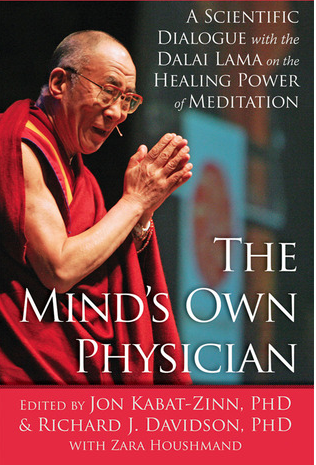Meditation as the Mind’s Own Physician?

I’ve begun reading a second book on meditation: The Mind’s Own Physician. I chose it because it’s put out by the Mind & Life Institute, who also put out the book, Train Your Mind, Change Your Brain, an excellent book by Sharon Begley which came out of a series of conversations in October 2004 between the Dalai Lama and a small group of neuroscientists in Dharamsala on the science of neuroplasticity.
The Mind’s Own Physician serves as a kind of sequel, coming out of a much larger conference in 2005 in Washington DC, jointly sponsored by the Mind-Life Institute, Georgetown University and John Hopkins. Here, scientists came together with experienced meditators and contemplatives, including the Dalai Lama, to look at “The Science and Clinical Applications of Meditation.” The book consists of a series of presentations and dialogues from the conference, and is edited by two of the presenters, John Kabat-Zinn and Richard Davidson. It was published several years after the conference, in 2011, and includes an epilogue with developments that have occurred since 2005.
It’s another good book for a beginner (though it’s not only useful for beginners). It complements well my reading of Why Meditate? by looking at some early findings in the science of meditation.
Interestingly, the moderator of the first session, and one of the contributors to the first chapter is Matthieu Ricard—who seems, now that I’ve learned about him, to be showing up everywhere. In his opening remarks, he offers a fairly succinct definition of meditation that I’m finding useful:
Meditation is not just sitting and blissing out under a mango tree in order to have a better day, although it might help. If we look at the Eastern roots of the word for meditation, it truly means cultivation—cultivating new qualities, new ways of being. It also means familiarization: familiarization with a new way of seeing the world; for example, not grasping at permanence, and instead seeing the dynamic flow of interdependence. Meditation means familiarization with qualities that we have the potential to enhance like, like unconditional compassion, openness to others, and inner peace. It’s also familiarization with the very way the mind works. So often we are full of thoughts that ceaselessly go through our mind. We hardly notice what’s going on. What is behind the screen of thoughts? Can we relate to some kind of basic mindfulness and open presence? All of these sorts of inner exploration are considered meditation.
Cultivating new qualities—like the qualities of compassion, openness, and inner peace.
Familiarization with a new way of seeing the world—seeing, for instance, it’s interdependence.
Familiarization with the way the mind works—looking behind the screen of thoughts.
I find this definition useful, because it’s helping me, along with some of my other reading, to put aside some of the pre-conceived notions I’ve had in the past about meditation: that it’s primarily about relaxing—or relieving stress—or that it’s primarily about watching the breath. Or blissing out. As I’m beginning to understand it, watching the breath is a useful tool for concentrating, and reducing stress in the short-term is certainly a good thing, but the goal can go far beyond this. It’s as if it’s what we do with this focused and concentrated mind that matters. As I understand it, this has everything to do with familiarizing the mind with new thoughts and qualities in order to end suffering—for ourselves and others.
Ultimately, this would end stress—but it’s not the watching the breath in and of itself that would end it. It seems instead that what happens is that meditating on new thoughts—new qualities—practicing them—has the potential to change the thoughts and qualities inside our minds—and this has the potential to change everything.
I used to have a picture of a meditation teacher as one with a soft almost monotone voice who was trying to get us all just to relax and settle down. Now I’m beginning to have a much more radical picture—a meditation teacher who doesn’t merely want to calm the mind down—though certainly that might have to happen first—but one who has much more radical intentions. Meditation not so much like a warm bath with candles and soft music. But more like open-heart surgery.
Open-mind surgery?
(And of course we would be the ones—each of us—deciding if these new thoughts and qualities such as compassion and inner peace are valuable—if they are worth opening and rearranging our minds for.)
__________________________________________________________
The Mind & Life Institute can be found here.
The Mind’s Own Physician can be found here.
